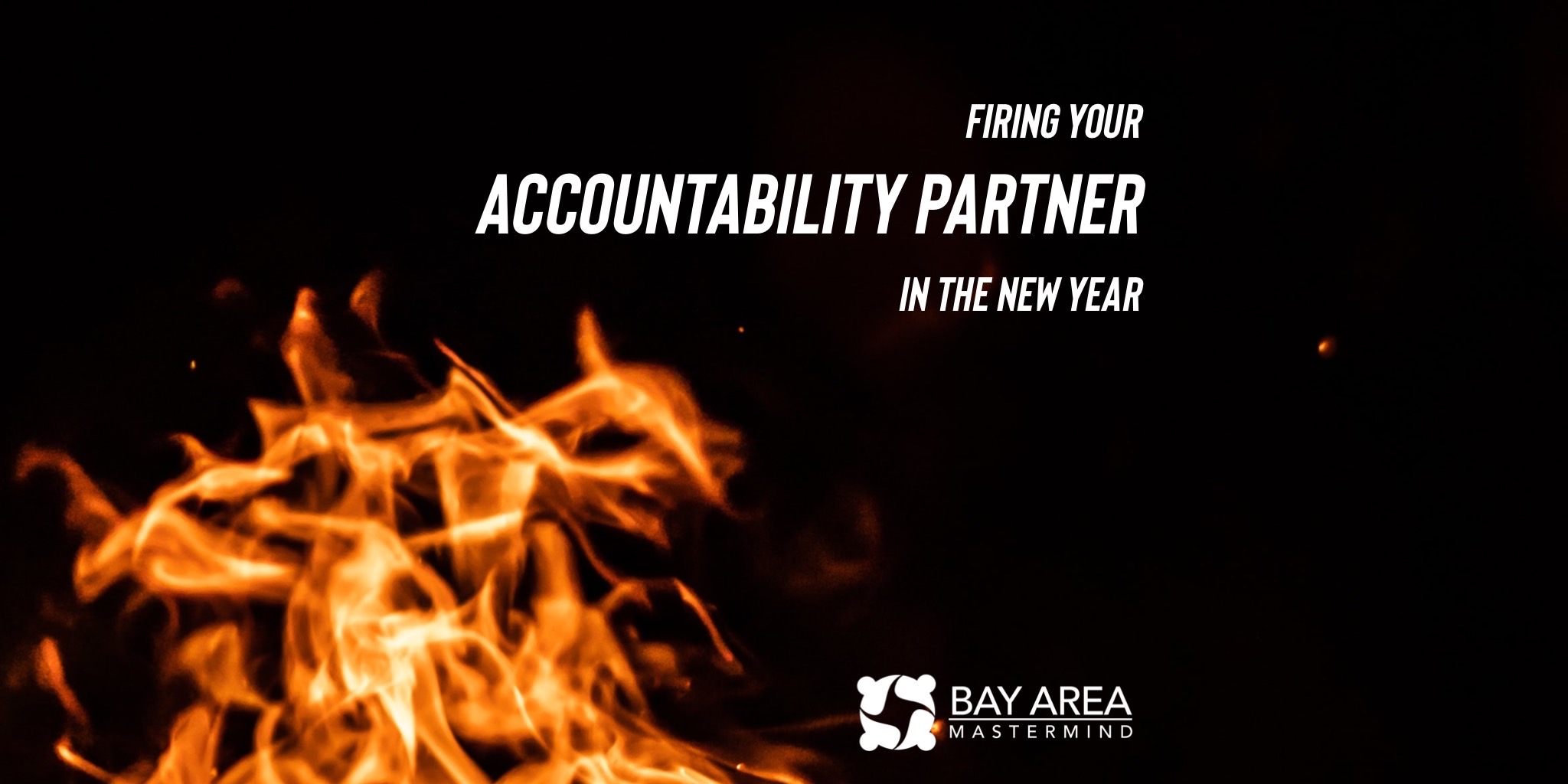
New Year’s resolutions are overrated. And your accountability partner likely is too. Here’s why.
There’s a good chance you’re in the 80%+ of Americans who give up on their “resolutions” in just the first 30 days of the new year.
Can an accountability partner help you stay on task with the positives changes you want to make in your life and in your business? Maybe. But probably not. Let’s discover why.
Resolutions vs. Goal Setting
Our focus here is on accountability partners, but let’s touch briefly on the difference between resolutions and goals.
Resolutions are like statements of what you want. They’re typically wishes and intentions. They’re not desired outcomes with actions and timelines.
“In life there are wishers and wanters, and doers and getter. Which one are you?”
Resolutions aren’t S.M.A.R.T.
Good goals are S.M.A.R.T. That’s Specific, Measurable, Achievable, Realistic, and Time bound.
A crappy resolution is something like “lose weight”, “grow my business”, “get to the gym more”, and garbage like that. Yawn.
A proper goal, however, is along the lines of “I’m going to safely drop 10lbs within 60 days by eliminating sugar from my diet and working out with my personal trainer 3 days a week.” or “I’m going to increase my company’s gross revenues by 30% within Q1 through partnerships by hiring a partner manager and personally connecting with 3 of our parters per day.”
Again, we’re not going to delve deep into goal setting here. I’m going to assume you’ve got your goals figured out and now you want an incredible accountability partner to help hold you accountable to your goals.
This is what makes an AMAZING Accountability Partner
So your friends said that accountability helps in boosting motivation to achieve an important goal. And agrees to help hold you accountable if you hold them accountable.
An accountability partnership is a good start, but accountability partnerships are only as good as who you pick, your (mutual) commitment, and how you plan to actually hold each other accountable.
So what qualities make a good accountability partner?
Accountability partnerships are only as good as:
- Who you pick
- Your (mutual) commitment
- Your plan to hold each other accountable
Do you have a family member or a friend or a stranger hold you accountable? Are they genuinely interested in your success?
You want the right person on your team. Someone who’s not afraid to be brutally honest with you. And who has their own goals – or even the same goal.
You want your partner to have your best interests at heart. And not be afraid of calling you on your BS an holding your feet to the fire.
But why is it that an accountability partner could – maybe – help you succeed?

How an Accountability Partner Can Help You Succeed
Throughout human history it’s not the lone wolves who survive. We find again and again that humans work in a group more efficiently.
As an entrepreneur, it can be lonely at the top.
If you don’t get done what you say you’re going to do… so what? You don’t have a boss. You don’t get fired.
The dirty secret is… nobody knows if you don’t do what you wanted to do!
That is until… you put out there what you plan to get done and put some real accountability in place.
A good accountability partner will treat all excuses equally. “I slept late” is just a garbage an excuse as “my car broke down” and “the building was on fire.” Something either got done or it didn’t. The why doesn’t so much matter as much as the lack of result.
That doesn’t mean there’s no empathy around the reason, just the fact that something did or did not get done. It’s as black and white as that.
Good accountability has some real stakes (more on that below)
And lastly, good accountability also has some real carrots, though ideally the outcome is the reward.
How do I find an accountability partner to help me build habits?
Finding the right accountability partner (or partners) to build your habits or accomplish your goals is the second most common challenge after creating SMART goals.
And yeah, you can have multiple accountability partners. I have my gym accountability partners, my business accountability partners, my cycling accountability partners, etc.
You’re looking for alignment with someone who wants YOU to succeed – and ideally is participating in whatever it is that you’re doing, too.
An accountability partnership means that you’re also holding the other person accountable – instead of it just being a one way accountability like you might have with a coach.
For example, a personal trainer can help you be accountable to showing up at the gym. But you’re not holding them accountable. They’re not an accountability partner – but they can help hold you accountable.
If there’s something you want to be doing at home or within your family, a family member can make a decent partner. For example, your kid can help hold you accountable to screen free meals. You both win when the screens are away.

If it’s a personal interest like fitness or sport, find the right person with similar interests. In cycling, there are what are known as The Rules and Rule V is to “Harden The F Up”, i.e. if something is difficult, you do it anyway. There’s also Rule IX which is “If you are out riding in bad weather, it means you are a bada**. Period.” i.e. no matter how bad the weather is, you still ride.
Finding friends who also follow The Rules and putting recurring rides on the calendar means that your friends are expecting you to be there. And you’re expecting them to be there, too. You wouldn’t let a good friend down, would you? And you wouldn’t want to be let down by a friend, right?
As for business, you can certainly work with a coach to hold you accountable, but for a true two way partnership, you’ll want to look to fellow growth-focused like-minded business owners.
The power of accountability
“Accountability breeds response-ability.”
– Stephen Covey.
Stephen Covey’s quote about accountability reminds us that being held accountable is about our ability to respond. Accountability helps us to do what we say we’re going to do.
When you find an accountability partner – be it a family member, sounding board, or friend with similar goals – you’re getting the support you deserve for achieving the goals that you create.
Yes, you can do what you say you’re going to do, but research time and time again shows us that we have a higher chance of success when we are responsible to more than just ourselves.
Think about the difference in motivation if you’re doing something just for yourself vs. if others are counting on you. What would stop you if your family was counting on you? What could stand in the way of you saving a loved one?
When you’re externally responsible, you have a higher chance of success.
An accountability partnership artificially – yet purposefully – adds in the support you need to be held responsible.
How to be a good Accountability Partner?
Remember that list above of what to look for in an accountability partner?
Yeah, those apply to you, too. You need to be everything you expect your partner to be and more.
If you say you’re going to show up for an accountability call or a morning check-in text, you have to do it. If you say you’re going to get something done, you owe it to your partner to get it done.
If there’s a plan to celebrate an accomplishment, make good on it. If your accountability partner responds better to the stick (see below), then make sure you provide the stick requested.
Both of you need to be equally responsible for holding each other accountable.
Both of you need to be equally responsible for holding each other accountable. Read that again. That’s the foundation of a great accountability relationship.
Do people pay for accountability partners?
Sure, you can pay for accountability partners – but what you’re really paying for is an accountability coach. See above.
If you’re going to pay for a coach, be sure you’re getting more than just accountability.
An accountability partnership is really a reciprocal relationship. You should both be as accountable to the other partner as they are to you. One partner shouldn’t have the full responsibility of the relationship.
You can also consider paying for being unaccountable. See below for more on being held financially accountable.
Can I be my own accountability partner?
Instead of looking externally for an accountability partner, you could track progress and be held accountable to your personal goals and financial goals by yourself.
Just make sure you can actually be held accountable.
And remember, we humans do better in groups than as a lone wolves!

How do you hold your partner accountable?
Motivation generally comes in two forms. The carrot. And the stick…. If you’re a donkey, these are motivating.
Keep moving forward, and you get [closer to] your carrot.
Stop moving forward, and you get hit with a stick.
The same holds true with accountability partners. Generally the carrot is the actual outcome that you wanted. You wanted to lose weight? Great, when you hit your goal, you got the outcome you wanted. You want to grow your business? Congrats, you hit your goal, and your business is larger.
Sometimes, though, an additional “sweetener” can help – if you need it. This can be as simple as the acknowledgement by – or a celebration with – your accountability partner.
Many years back (yeah, I’m dating myself here!), I set a business growth goal with a good friend and upon completion of our goal, I was going to get myself a satellite radio for the car! This was way back when satellite radio was brand new to the market. Well, when I hit my goal, my friend surprised me by gifting me the satellite radio receiver and I been looking at. Not only did I hit my new business goal, but I got the carrot I wanted, AND it was a gift from a friend. Triple win!
As for the stick… pick something that you really won’t want. When you don’t take the agreed upon action or hit your agreed upon goal, you get the stick you chose.
A popular stick that I love is to pick a cause you feel strongly about.
Make it something political. Religious. Personal.
Now go find a non-profit that supports the opposite of the thing you love and feel strongly about. Commit to making a donation to that cause when you don’t do what you said.
You feeling uncomfortable? Good, that’s the idea. You don’t want to have to make that donation.
One of our Mastermind members typically stayed up late at night working on his business and as a result slept in late most mornings and didn’t get done all of his morning routine items that he wanted. He wanted to start his day early with a plan for the morning.
As a simple accountability, he committed to text me each morning when he got up with his game plan for the day. And more importantly, he committed to making a $100 donation to a cause he strongly opposed on any day he didn’t send the text by 6am.
Most every morning I got the text early or on time with an “I’m up” and a “Here’s my plan for the day”.
But… some mornings I didn’t get that text by 6am. And a donation was made. That only had to happen a few times early on to never be an issue again, and after a month of morning check-ins, the habit was established, and no more check-ins were needed. The behavior had been changed.
This method combines personal responsibility with external accountability and a little bit of tough love.
Putting it all Together
Now you know why you want an accountability partner, how to find a partner, how to be a good accountability partner, and how to hold each other accountable to your personal goals, professional goals, and new habits.
If your existing accountability partnership isn’t living up to these standards, it may be time to review the challenges, check your blind spots, and discuss the level of commitment in your relationship.
Communicate your specific goals, put in the hard work and effort, and enjoy the journey together with a partner.
Who’s Your Peer Advisory Group?
Who do you bounce ideas off with, get expert insights from, and share resources with?
Are you ready to connect with like minded Business Owners, Founders, and Entrepreneurs who’ve “been there, done that” ?
Join us at the Bay Area Mastermind for a Test-Drive and see if our Mastermind is what you’ve been missing.
Further Reading: